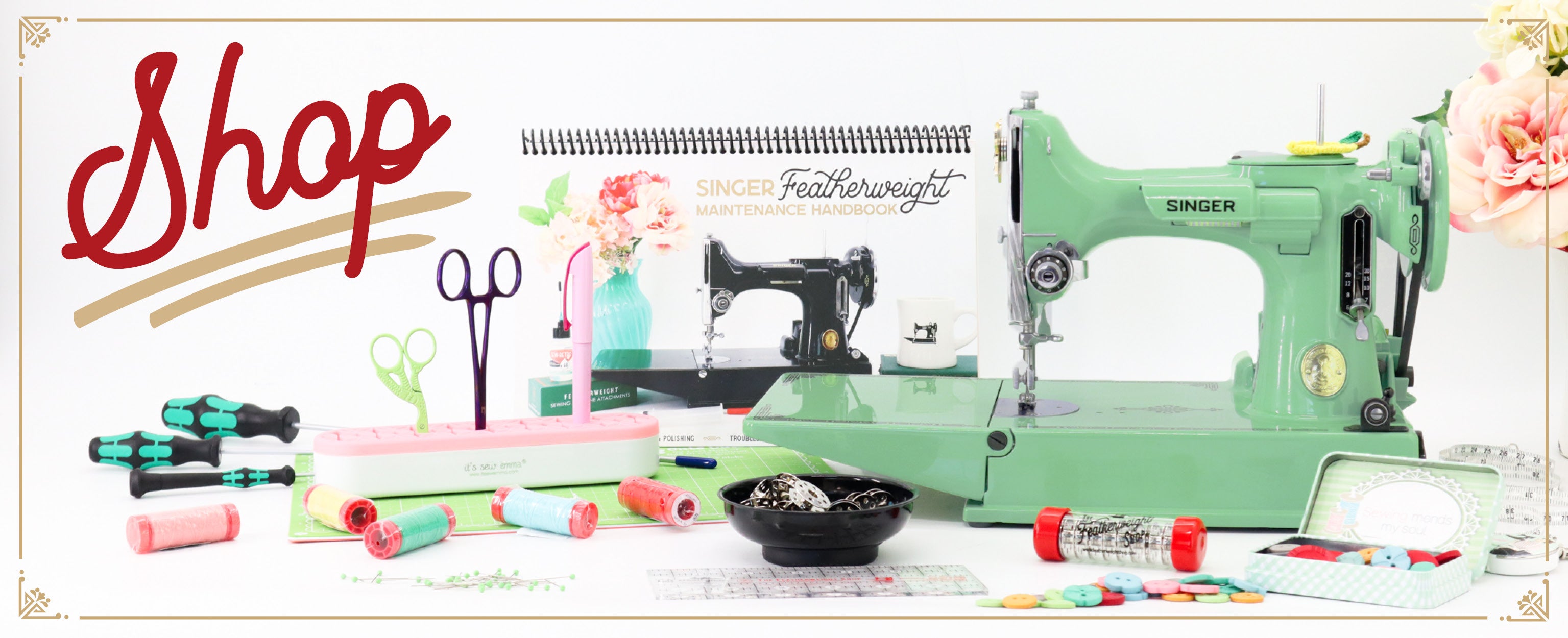FAQs
Featherweight FAQs
UPDATE: This article is very helpful when learning to distinguish a bona fide Singer Featherweight compared to other older, black Singers from the same era.
Many people wonder if their old Singer Sewing Machine that came with a carrying case and is "portable" gives it the classification of being a Featherweight. While the old black Singers bear similar appearances with their elegant shape, sleek black paint, and smooth lines, the first evidence to consider is the name difference, that being the word "feather" in Featherweight. The old Singers in wooden domed top cases or rectangular tweed-covered cases are quite heavy, and produced of cast iron. In fact, most old Singer Sewing Machines were made of caststeel.
A Singer Featherweight is limited to the Singer 221 or 222 model classificationonlyand is made of cast aluminum, weighing just over 11 pounds. It also has a quick identifying feature with the sewing surface or bed extension that flips up on the left side (see photo below), allowing it to compactly fit into its case. If a machine does not have these same Featherweight identifying features, then it's a different Singer model in another style classification. Further information on the other Singer models can be found at ISMACS.
2a. Originally, Featherweights were priced anywhere from $125 - $150 back in the 1930s to 1950s. (in 2024, and with inflation considered, that same dollar amount would be equivalent to about $2800!) That said, the value is mostly subjective with any item, including Featherweights. An item or service is only worth what someone is willing and able to pay for it. It also depends on the location of the item, availability of Featherweights in a given area, and the choice of venue. Prices can be gauged from various websites - eBay, Craigslist, Kijiji, etc. and that should provide a ballpark average for the typical Featherweight, all things considered.
Check what they actually sold for, not what someone is necessarily asking.(Particular, specialty Featherweights are going to be the exception to the average price). Items will almost always be less when purchased from a private individual versus ordering from a reputable dealer; however, a reputable Featherweight dealer offers additional value to those who want something ready to sew and guaranteed.
2b.Do we buy machines? Yes, we do! Our grading system is very, very particular so that our customers can be assured that the grade it is given is the graded machine they will receive. We have a large clientele base and because of the fastidious process we take in selecting and servicing each Singer Featherweight that goes through our shop, our customers will wait - often months at a time - to purchase a machine from us. The Featherweight machines our customers buy from our shop are those that are loved, cherished and used to make many, many lovely quilts. (We have several customers who are even collecting Featherweights for their granddaughters to learn to sew on!) Just remember that we are The Singer Featherweight Shop, so like most antique shops that buy items for their store, we have to purchase things at a price that still affords us to earn a living for our family. This is why we use eBay for our pricing gauge for the current market price of the average Singer Featherweight. So, you can either sell it on eBay with their fee structure, and bidding process (and take a chance as to the final price), or you can sell it directly to us with no eBay fees, feedback concerns, customer service issues, etc. - plus we cover the cost of postage. Your machine could be one of those that are passed down to the next generation as a very special memory and family heirloom! Please contact us if this is the avenue you would prefer to take to sell your Singer Featherweight machine.
You can contact us through our contact page! We will be happy to assist you.
Write a clear and concise answer to guide your customers.
Contact
Please visit our Contact page.

